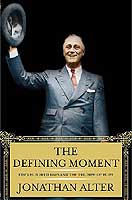
Secure Online Ordering Guaranteed!
|  |
The Defining Moment: FDR's Hundred Days and the Triumph of Hope
Jonathan Alter


 |
 |
Retail Price: $29.95
LS Price: $22.45
You Save: $7.50 (25%)
Availability: Usually ships within 48 hours
Format: Hardcover, 432pp.
ISBN: 9780743246002
Publisher: Simon & Schuster
Pub. Date: May 2, 2006
Average Customer Review:




|
 |
 |
 |
Order This Book!




Secure Order Guarantee
Item No: 9780743246002
|

Excerpt from The Defining Moment: FDR's Hundred Days and the Triumph of Hope
Author's Note
In more than two decades covering politics, I've had a good look at many of the leaders who shape our world. Sometimes I interview them one-on-one; more frequently, I watch from the crowd, where the vantage is often superior. Once in a while, I'm lucky enough to witness what since the early 1980s has been known as a "defining moment," when the character or perception of a political figure is crystallized. I was in the theater in Prague in 1989 as Václav Havel announced that the Czech Communist Party had fallen from power; I rode around in a small bus with Bill Clinton in 1992 and with John McCain in 2000 as each defined himself for a national audience in just a few weeks in New Hampshire; I stood five feet from George W. Bush at a smoldering Ground Zero as he vowed through a bullhorn to retaliate for the attacks of September 11, 2001.
But whenever I think about defining moments, I keep going back to the one that took place a quarter century before my birth -- the desperate winter of 1933 when Franklin D. Roosevelt narrowly escaped assassination, then restored hope with his "fear itself" Inaugural Address, his first "Fireside Chat," and the thrilling legislative experimentation of what came to be known as the Hundred Days.
This book is not a full account of Roosevelt's life or of the early New Deal. Instead, it's the story of how at one of the darkest moments in American history, a political and communicative genius saved American democracy. FDR's intelligence was hardly at genius levels; he was lampooned right up until 1933 as a lightweight. So I've included a biographical opening that examines where he acquired the sense of security that he later conveyed to the world. This section takes him from mama's boy through Washington operator through the trauma of polio. Then I focus much more closely on one pivotal year: from June 1932, when he was nominated for president in Chicago on the fourth ballot, until June 1933, which marked the end of the Hundred Days. The culmination of that momentous period is covered in a final chapter on Social Security and in the Epilogue.
This is a thematic narrative -- a slice of history -- that details how Franklin Roosevelt became president of the United States and revived the spirits of a stricken nation. I try to trace both his manipulative streak and his famously first-class temperament, which helped lift Americans out of their mental depression without curing their economic one. FDR's stunning debut in office was the flowering not just of versatile thinking but of brilliant instincts for leadership. Who influenced him? How did he grow himself into a surpassingly inspirational figure? What grand mixture of timing, cunning, and character gave him and his generation what he later called a "rendezvous with destiny"?
Roosevelt died in office in 1945 before he could write any memoirs, and his letters in this period are mostly dutiful and unrevealing. He was the first president who did most of his domestic business on the telephone, where, with a few exceptions after 1940, his conversations went unrecorded. So another angle of vision is required. Sometimes my lens is journalistic, as I scan for the revealing anecdote; sometimes it is more historical, a search for deeper connections with the help of archival material from the 1932-33 period or for the leadership secrets behind FDR's swift "turnaround" of a failing enterprise. Taking a cue from FDR, who referred to himself at Warm Springs, Georgia, as "Old Doc Roosevelt," I also see my role almost as a doctor examining a patient, in this case a man who became the most important president since Abraham Lincoln, and the most underestimated.
FDR was, by many accounts, the most consequential man of the 20th century. Yet it is now nearly 125 years since his birth and more than sixty years since his death. With that in mind, I've included footnotes with bits of historical context and a few comparisons to recent presidents to help illuminate the main roads of the story. The Notes section identifies sources and provides amplification.
Although the Roosevelt literature is vast, no previous book about FDR has concentrated so closely on his role in the 1932-33 period. In recent decades, most authors have focused on the later years of his presidency. FDR may be commonly remembered for bringing victory in World War II, but it's worth recalling that he did so only with the help of the Allies. The first time he saved democracy, in 1933, he accomplished it more on his own, by convincing the American people that they should not give up on their system of government. Before he confronted fascism abroad, he blunted the potential of both fascism and communism at home.
Instead of viewing the Hundred Days as the opening act of the Roosevelt presidency -- the more traditional historical approach -- I depict it as the climax of an exquisite piece of political theater. This performance was only possible because of a supreme self-confidence in his ability to lead the country when it was, as he later put it, "frozen by a fatalistic terror." The story that follows, then, is not just about the early days of the Roosevelt presidency but about where his confidence came from, and how he used it to win power, restore hope, and redefine the bargain -- the "Deal" -- the country struck with its own people.
The result was a new notion of social obligation, especially in a crisis. In his second Inaugural, in 1937, FDR took stock of what had changed: "We refused to leave the problems of our common welfare to be solved by the winds of chance and the hurricanes of disaster."
We live in an age when the question raised by any work of history is: Why now? Roosevelt is of lasting interest not just because we, too, must face our fears, real and imagined; not just because of a few similarities and many differences between him and another president with a famous name, confronted with big problems. I wrote this book to better understand a few timeless questions about the nature of crisis leadership and the meaning of the American experiment in self-government. What is government for? How can it be mobilized in an emergency to secure safety and ease suffering? Where do hope and inspiration come from, and what might they accomplish?
Nations, like politicians, occasionally experience defining moments, where their course is fixed for generations in the historical blink of an eye. "His most dazzling successes were domestic and psychological," wrote the novelist Saul Bellow, who grew up worshiping Roosevelt in Chicago. "It is not too much to say that another America was formed under his influence." My goal is to explain and re-create that psychological success, the one that brought us this new America -- a country of commitment to one another, with a set of governing values we are debating anew today.
Copyright ©2006 by Jonathan Alter

Customer Reviews
Write your own online review.

Find Items On Similar Subjects
 The Defining Moment : FDR's Hundred Days and the Triumph of Hope - Hardcover The Defining Moment : FDR's Hundred Days and the Triumph of Hope - Hardcover

|
|


